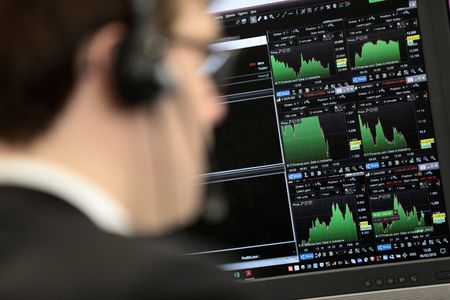 1
1 1
1

By Samuel Indyk and Pete Schroeder
LONDON/WASHINGTON (Reuters) -Wall Street opened higher on Tuesday and bond yields continued to swing upward as Russia’s invasion of Ukraine weighed on global growth expectations and looming Fed tightening kept investors on edge.
The International Monetary Fund slashed its forecast for global economic growth by nearly a full percentage point on Tuesday morning, citing “seismic waves” from Russia’s invasion and the “clear and present danger” of inflation in many countries.
Investors were also preparing for the next barrage of company earnings that will help them assess the impact of the Ukraine war and a spike in inflation.
Heineken, Nestle and Renault report out of Europe this week. Netflix, Tesla and Verizon are scheduled to report this week from the United States.
Buoyed by good earnings reports out of the financial sector in recent days, Wall Street opened on Tuesday higher after a choppy trading day on Monday.
The Dow Jones Industrial Average rose 266.7 points, or 0.78%, the S&P 500 gained 0.67% and the Nasdaq Composite added 0.5% in early trading.
The MSCI world equity index, which tracks shares in 50 countries, up 1.5%.
Yields on 10-year U.S. inflation linked bonds held near the two-year highs they reached on Monday, and are within touching distance of turning positive for the first time since the onset of the COVID-19 pandemic.
Equity investors had been reassured by the fact that, when stripping out the effects of inflation, bond yields had been deep in negative territory, but that looks set to end.
The Federal Reserve looks all but certain to raise its interest rate by 50 basis points when it meets next month and a 75 basis point hike has not been ruled out.
St. Louis Federal Reserve President James Bullard repeated his case for raising rates to 3.5% by the year-end on Monday, adding a 75 basis point hike should not be discounted, although this was not his base case.
“I think that’s a good reminder for markets that that is actually possible but he is known for his hawkish views so you do have to take that into account as well,” said Baylee Wakefield, multi-asset portfolio manager at Aviva Investors.
The dollar index rose above 101 for the first time since March 2020, as the greenback hit a 20-year high against the yen and tested a two-year peak on the euro, amid higher U.S. Treasury yields.
The benchmark 10-year Treasury yield was last at 2.9264%, hitting its highest levels in three years. The 30-year U.S. Treasury yield rose above 3.0% for the first time since early 2019.
Oil prices fell after floating near their highest since mid-March amid global supply concerns after Libya was forced to halt some oil exports.
Brent crude futures were last down 3.68% at $109.02 a barrel. U.S. crude futures were down 3,86% at $104.03 a barrel.
Gold prices were lower after coming close to reaching $2,000 an ounce during Monday’s session. Spot gold was last at $1,963.70 an ounce.
(Reporting by Samuel Indyk and Elizabeth Howcroft in London and Pete Schroeder in WashingtonEditing by Mark Potter, Will Dunham and Barbara Lewis)